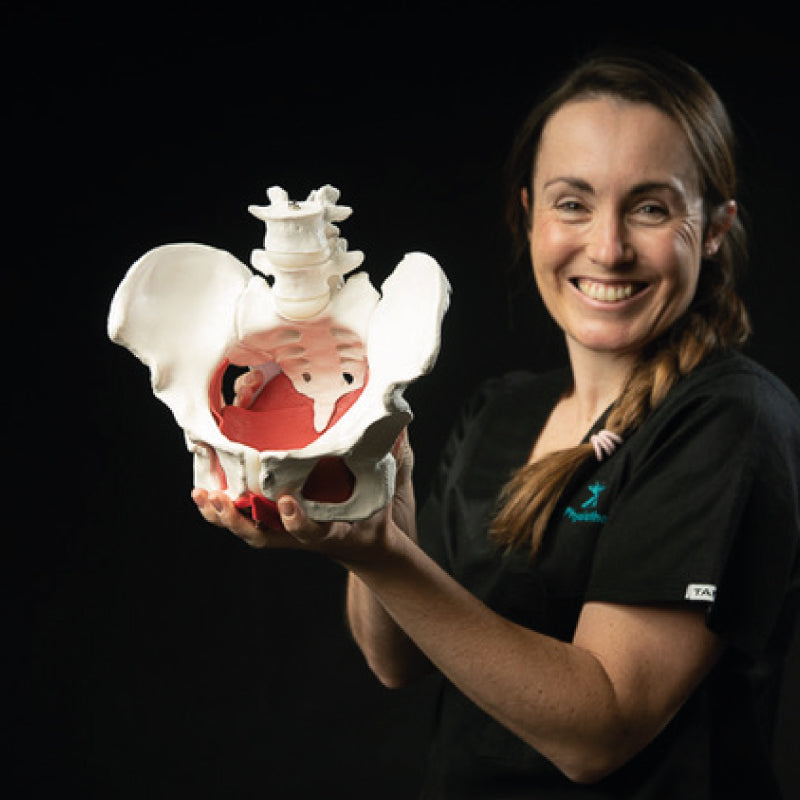Your Cart is Empty
Buy Now

Pelvic floor Awareness - by Physiotherapist Kirsten Nel
August 25, 2020 3 min read

Your pelvic floor is a phenomenal group of muscles that are located at the base of your pelvis. Often described as a hammock/sling or basket these muscles play an important role in the support, stability and function of our bowel, bladder and sexual/reproductive organs. Contracting and shortening the hammock will maintain continence and abdominal pelvic stability however relaxing and lengthening of these muscles is just as important so that normal bowel and bladder motions can occur, sexual intercourse and climax is possible and birthing a baby naturally is also possible.
During pregnancy, the pelvic floor works very hard to also support the growing baby and stabilise the increasing pressure being placed on the organs it houses. It also plays a big role in supporting the spine and the change in the centre of gravity placed on the body by baby growing at the front.
So, what are some of the signs we can look out for to be aware of our pelvic floors and recognise its cries for help?
- Leaking urine during and after pregnancy.
This is a big red flag that the pelvic hammock is not functioning optimally. Often assumed to be a weakness due to looser muscles and also assumed to be a problem more from natural birth both of these are not the case. Stress and tension can tighten the muscles causing weakness and c section mums are in the same boat.
- Pelvic girdle pain
This occurs mainly during pregnancy in the form of pubic symphysis and SIJ (sacroiliac joint) pain and can be quite normal as a result of the pregnancy and stretching of the joints in preparation for birth but it’s good to check in with a pelvic physio for some advice and pain relief. Pain in the lower back, hips and pelvis post-partum can indicate the pelvic floor is not contributing to normal postural synergy.
- Painful sex and change in orgasm
This is very common and causes a lot of pressure and emotional stress on couples which is so hard along with the new baby. Once again stress and strain on the pelvic floor causes trigger points or spasms to occur which don’t feel very nice when the penis penetrates. Unfortunately, the brain begins to associate sex with pain which means your body goes into a state of tension each time you engage in intercourse which leads to more pain. Breastfeeding also naturally reduces libido and lubrication and if you had any tears or an episiotomy healing and scaring can reduce normal sensation to hypersensitivity or numbness. Changes in orgasm are also common due to hormones settling, pain from what has just been mentioned about pain. The pelvic floor rhythmically contracts during climax so if there is any spasm this movement will be inhibited.
- Constipation
The bulk of the pelvic floor surrounds the rectum and anus and once again spams and tension can affect the normal bowel motions. Diet, painkillers and stress can also affect this so often the pelvic floor is over looked. Keep in mind that this could be the cause.
- Mummy tummy – Diastasis Rectii
100% of women will have this during pregnancy as the tummy expands out but post-partum any doming or gapping of the abdominals needs to be assessed and managed correctly. The pelvic floor is part of the body’s core muscle structure and weakness in the pelvic floor can have a role to play in a loss of synergy between the abdomen, lower back and pelvis.
It sounds bad but there is plenty to be done to help our pelvic floors out.
- Maintain good core strength during and after pregnancy
- See a pelvic floor physio during and after pregnancy to be assessed and guided correctly.
- Keep active with gentle exercises like walking.
- Avoid high impact or bracing exercises until guided to do so.
- Connect with your body, be mindful so you can listen to what it tells you.
- Recognise stressful triggers and manage them – we hold a lot of emotional stress in the pelvic floor.


I am a pelvic floor physiotherapist practicing in Joburg. My special interest in Women’s Health stems from not only being firstly a woman and mother myself but also from a passion for empowering women about their amazing bodies and how it works in harmony with the surrounding environment. My work focuses specifically on the unique health issues that women face and aims to help women heal as a whole being mentally and physically.
It’s all about self-love ladies
204 Oxford road Illovo
Johannesburg
Johannesburg
Subscribe
Sign up to get the latest on sales, new releases and more …











